#he said something very enlightening about resistance through poetry
Text
been listening to refaat alareer's lectures on poetry on the subway and it's brought me to tears several times. i want to transcribe them and compile a document of all of them as soon as possible.
#there was this part where a female poet was referred to as '[name]'s sister' and he corrected it and said#to be careful not to restrict women to men's shadows even if these men are their family and#when i heard that i thought of that fuckface reporter who kept interrupting the palestinian speaker she was hosting#and she said 'you're probably not used to women speaking'#anyway. i love his words and i feel like i have more a connection to poetry than i've ever ever had through him#he said something very enlightening about resistance through poetry#and i don't want to paraphrase because i want to transcribe and share his exact words but god. god. i've never felt the power of poetry so#so strongly*
45 notes
·
View notes
Text
On Seeing: A Journal - #259 June 12th, 2018
"Above & Beyond with Adam Gopnik”

Adam Gopnik is a Renaissance Man’s Renaissance Man. A long-time staff writer at The New Yorker, he is an essayist, a critic, a playwright, a novelist, an author of children’s books…in short, the epitome of the enlightened human. I read his writing avidly, and, a few weeks ago, invited him to our studio to participate in my project “ABOVE and BEYOND.”
A three-time winner of the National Magazine Award, Gopnik has amazingly broad knowledge of many areas, including: Art and art history, culture, politics, music, even sports. His first essay in The New Yorker, "Quattrocento Baseball," appeared in May of 1986, and he served as the magazine’s art critic from 1987 to 1995. During our interview, he spoke in perfectly structured, literate English, as clear and precise as his written words.
Here are some of Gopnik’s thoughts that I found especially compelling from our interview:
HS: So prolific, I wonder how you organize your life. When do you write? When do you read? When do you think? When do you go to museums, see friends, have a life? You must have some efficiently organized method in order to produce as much as you do.
AG: I have a very standard routine. I start drinking strong coffee early in the morning. I go off to my little study and I write for four hours. I have many sisters, one of them a distinguished psychologist, and she says that you can only do creative work intently for four hours at a stretch. So, I do four hours from nine til one, every day.
I try not to do anything else. I’m just there to write. I do it in a way that makes it maximally uncomfortable for anyone else who intrudes on me, because I can only write if I’m playing extremely loud rock music from my high school years: Jethro Tull; Eric Clapton with Derek & The Dominos, that great Layla album; Jimi Hendrix; all of that music.
HS: You play this music, and loudly, as you write?
AG: I can’t think if I don’t have the music, that’s the funny thing. I also overheat terribly as I’m writing, so I have to keep the windows open in the middle of winter.
I’ve had a series of wonderful assistants just coming out of college, and they’re sort of excited about the job. You know, “I’m going to be a writer’s assistant and see the elegance of a New Yorker writer’s life," and instead it’s just a little man, four hours a day, in a brutally cold room with incredibly loud music playing, and that’s their experience. So, they’d retreat into the hallway and spend the time talking with my wife.
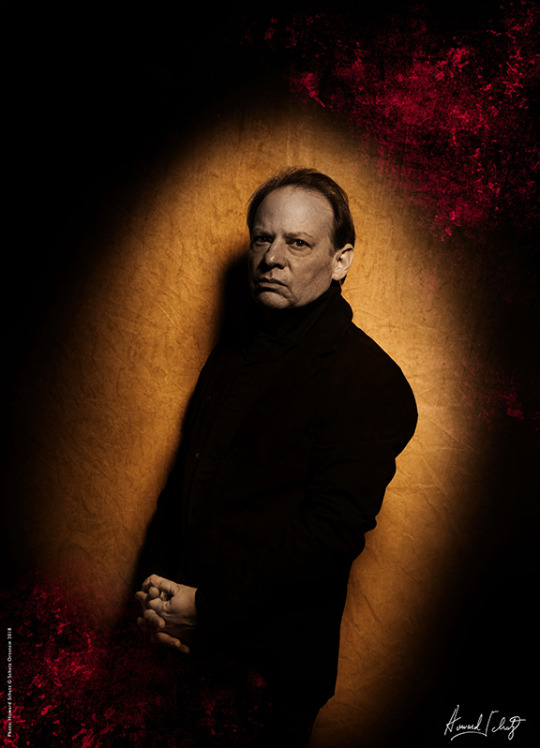
HS: Where and how do you think your work has had greatest impact given the political and cultural bias of The New Yorker?
AG: Writing for The New Yorker, which is a traditionally liberal magazine, of course you ask yourself a question, "what am I really affecting here?" because I’m writing to people who agree with me in advance. But, if you look at the greatest political editorialists who have ever lived, Albert Camus, for instance, they were writing themed journals that were directed to people who were inclined to agree with them in the first place.
What we do, I think, as citizens, writing, is not so much to change minds as to bear witness.
What you want to say is not, “here’s an argument that will convince you of the opposite of what you believe already, but here’s the kind of argument you ought to be making to the people who don’t agree with you."
HS: We live in a time with a bully in the White House. And, yet, despite the mean-spirited and hypocritical behavior, there are still thirty to forty percent of Americans…
AG: Who love him.
HS: And my question on changing people’s minds comes from something you wrote in your wonderful book, "At the Strangers’ Gate," that was astounding. I’d like to read it and perhaps you can comment on it:
"No one really surrenders an illusion in the face of a fact. We prefer the illusion to the fact. The more facts you invoke, in fact, the stronger the illusion becomes. All faith is immune to all facts to the contrary, or else we would not have such hearty faiths and such oft-resisted facts. If your faith is in life’s poetry, as ours was, a tiny room inadequate by any human standard and designed to make life borderline impossible looks appealing. The less possible it becomes the more beautiful the illusion looks. Such illusions – call them delusions; I won’t argue now – grow under the pressure of absurdity, as champagne grapes sweeten under the stress of cold ground."
AG: Yes, I think that’s true. I mean, I was writing specifically there about the reality that when Martha, my then girlfriend, now wife for many years, and I moved to New York, we were enraptured with an idea of poetry, a kind of metropolitan poetry. And, the apartment we moved into was 9x11 basement room overrun by cockroaches in which there was about as little poetry as you could expect to find in the world.
But, we weren’t disillusioned by it. We simply doubled-down on the myths that we were self-creating, and I think that’s generally true. You know, no one is ever argued out of a religious faith by contrary facts. No one is every argued out of a political ideology.
That’s the problem we’re faced with: You can’t resist a figure like Trump by appealing to the facts, by saying he lies all the time, because the people who admire him like the fact that he lies all the time. The lies, in a certain way, are appealing to them because it gives them license to indulge their own fantasies. In other words, if somebody tells you three million people voted illegally in California, it’s an outright, absurd lie. But, that an authority figure says it gives you a right to believe in it.
If your question is what do you do then, when you have a leader who is completely allergic to facts and who appeals to an audience that’s resistant to facts, I think the answer is that you can’t fantasize that you’re going to convert those folks.
What happens is that you get new generations who just don’t buy it. If you think about the great social changes, the great positive social changes of our time, they tend not to happen because you have people who are entrenched in a bigoted or old-fashioned reactionary position who are converted. What tends to happen, is the young generations who come along simply don’t enlist in the bigotry.

HS: I’d like to talk about the natural history of creativity, its life-cycle. There’s sort of an apex, a fertile period of creativity, then a downturn. Recently, I heard Dylan say when asked about his seminal work of 50 years ago, "Who writes like that?!" Probably everybody’s curve is different and maybe some people have a second curve. Do you have any thoughts about that?
AG: I think that any honest, creative person is bound to confess that when one looks at other artists and creative people, you tend to see that they have a high period and then a falling off period.
Bob Dylan is a remarkable character, but there’s no question that the Dylan between 1966 and 1974, between Blonde on Blonde and Blood on the Tracks is the Dylan who we’ll remember. Paul McCartney is a musician of limitless melodic invention, but the McCartney we’ll remember is between 1965 and 1969. So, there’s a lot be said for the idea that artists ought to retire in a way that fighters ought to retire before they get punch-drunk and lazy-legged and all the rest of it. However, what I do think is true is that even if you accept that all creativity is cyclical and has a falling off point, there’s still an enormous value in artists persisting, because artists don’t just give us the gift of their products, they give us the gift of their example.
Dylan 2018 is not writing songs the way Dylan 1968 did, but it’s wonderful to see him continuing to stand up there with his croaky voice and his little mustache bearing witness to what it is to have been Bob Dylan.
HS: Do some artists have two periods of great work?
AG: Yes, I think they do. Matisse did unimaginably beautiful work between 1905 and 1920; went on doing interesting, not nearly as profound work and then, suddenly, as an old man changed his medium, started using scissors instead of a paint brush and, once again, did utterly sublime work.
De Kooning, another artist who had a great late blooming. Philip Roth, to take a name that doesn’t seem to sit with de Kooning and Matisse, maybe, at first, through sheer dint and intelligence continued to blaze new kinds of witness, new kinds of writing, in part, because he had the enormously smart idea that he should write about what it was like when he was young again. Instead of trying to bear witness again and again to the new world, he wrote very much about New York in the 1940s.
I don’t think silence is a good answer for an artist, even if an artist is aware that it’s a general rule that you do your best work at a particular moment; the work that people will remember most.
HS: What are your thoughts on the larger issues of the day, especially fake news and how, in a way, it threatens our democracy?
AG: Fake news is one of those things that has managed, through the mendacious spin of a very mendacious man, to totally reverse meaning. When fake news was first talked about people meant actually manufactured fraudulent stories that were being passed around on the internet, very often to the benefit of Donald Trump.
He turned it around to make it an accusation at people who were actually doing real news: CNN, The New York Times and so on, who do their work in the same flawed and imperfect way that we all do our work, but who genuinely are trying to report the world as it is. It’s Trump, the man who speaks loudest about fake news, who is the most culpable of spreading fake news… “three million people voted illegally, I had the biggest crowd," and on and on and on.
So, I don’t feel fake news is as big a problem as the people crying about fake news. In other words, it’s when the governing class decides to demoralize the population by telling them they can’t believe anything that they’re being told. That’s when you get the crisis.
I’m not worried about fake news. I’m worried about fake politicians.
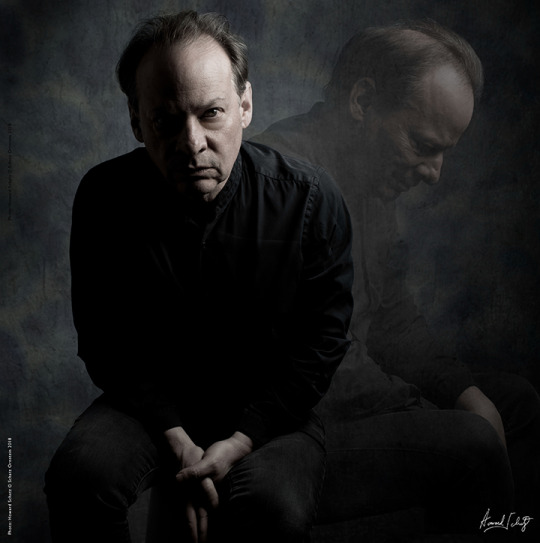
5 notes
·
View notes
Text
INGMAR BERGMAN’s WAITING WOMEN “The distress button is broken”

© 2021 by James Clark
Our film today, Waiting Women (1952), will forever be understood as only a “minor” effort due to being an early film in Ingmar Bergman’s history and therefore supposedly lacking in the full sophistication of those titles having convinced the ‘experts’ to be the best. Here’s the difficulty of that position. There is no evolution of his gifts. They began exploding world history from day one, and have marched across many decades in hopes that his dramas would find those aware that a catastrophic myopia has left planet earth to remain a “minor” phenomenon.
Within such strictures, the artist has shown that even a dying planet can supply light years of fruition. The way of such supply is truly majestic. As we touch upon our early hope today, we soon realize that one of Bergman’s most rich manifolds has spread its dark and persistent invitation to us at this site. Three women, waiting in a fine Swedish summer cottage for the annual arrival of the spouses, they being Marta, Rakel and Karin, have a mind to entertain their friends with vignettes of their past. (Before hearing this remarkably candid series of earthquakes, we have, for the asking, other such women occupying those names, in other films by Bergman. Another Marta, having been a professional symphonic musician, and going on to [feebly] transcend the pitfalls of showy skills, appears in the film, To Joy [1951]. Another Rakel, having been a professional actress on the stage, and going on to declare that the theatre is shit and sees fit to commit suicide, appears in the film, After the Rehearsal [1984]. A Karin, having resisted heavy pressure from her family to become a solo cellist, opts for being a very small-town classical orchestra player, which leaves her a pariah and seen to be responsible for her father’s suicide, appears in, Saraband [2003]. All three films are discreetly shot through with incest.) Waiting Women, deletes the arts in favor of big business. But incest races apace there, and its malignancy brings corporate advantage and pedantry to a fresh critical perspective.
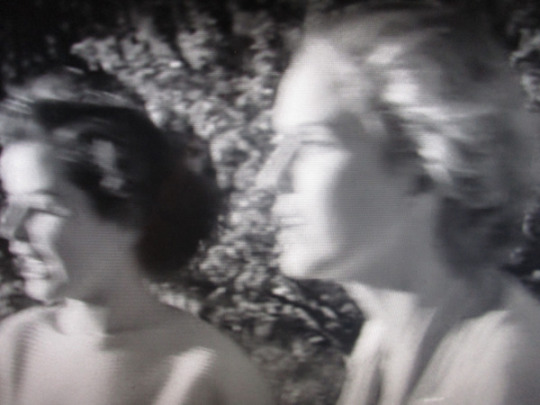
By way of a tonal cue, the preamble pertains to very young children being hidden in play along the shore and thereby a worry. The kids embrace the hidden side, and gently (this being the area of gentrification) reap a scolding from the forces of pedestrian safety. Later, when dusk falls and the mysterious forest and sky are given a quick view, the darkness speaks to no one on the premises.
Not that the startling is entirely absent. But, as we get down to business, the startling, here, brings dangers of serious destruction. The aspect of incest in the few films we find ourselves in the midst of, consists of only one of the ravages bearing down upon a population rife with crude advantage. Once again, as so often, our guide tries to take us by the hand and confront the ravenousness needing to be outmaneuvered. These films do not present the traditional soothing which mainstream film viewers crave. In sharp contrast—along with scintillating drama—we meet an endeavor as to an unsung ontology (an unsung dynamics), where mathematics are not the rule and paradox go to school, forever! The several surprising approaches punctuating the scenario, with touches of cosmic, ironic force, offer the viewer a highway of daring, not for shut ins, not for pedantic, “intellectual” craving.
Those worried women compose a gaggle of patricians (the credits showing a rococo idyll), being a major target of Bergman’s critique. This film, in fact, being a vigorous scrutiny of that social power-play, rotten to the core. The women at the seashore are in anticipation of the arrival of the moneybags about to grace an instance of idleness and lavishness. They think to improve—one of them cursing her fate about a dull spouse—by commiseration in the failings of their households. In doing so, the women reveal that their attentions are, with a slight exception, feeble. But this being Bergman, strengths also reign, to possible rich enlightenment.

With the rubric in the air, “It can’t be meant to be that way,” Rakel, addressing the group, begins with, “You’re not as unique as you as you think…I remember the day Eugene and I were forced to wake up and face the situation. It was both ridiculous and appalling. But that’s nothing to talk about…” More naïve interjection insists, “Why not? We can learn something about each other, and thereby make it easier living together during our vacation and maybe afterwards as well…” Rakel—a lady with a bombshell—takes a breath and remarks, “Well, if you want to… It was two years ago. Eugene and I were alone out there that summer. Eugene was writing his history thesis, and I took care of the house. Upstairs and idle at her mirror, her brother Kaj walks in. ‘Good day, little Rakel.’” (The relationship is never explicit, but on the other hand it is crystal clear.) “Where’s your wife?” she demands. His statement of fact is, “She can’t make it. She didn’t feel well with her pregnancy.” Another statement of fact is by Rakel, namely, “Eugene has gone to town.” (Kaj is there for another going to town.) As to Eugene’s studies, the visitor sneers, “Colossally interesting!” She maintains, “Eugene has always been interested in antiques”[and their capacity to deliver quiet treasures]. That he’s despised by the affluent family having to keep Rakel and her supposedly useless husband afloat, becomes another “Colossally interesting” juncture, namely a license to make love to his sister. He fondles her neck. And soon, after feeble resistance, they share a passionate kiss. He continues, “You’re just like when we were kids. You’re as soft and indulgent. Just as pretty and fragrant. And just as flushed and irritated afterwards.” Her stance, as it veers crazily, comes to, “No, thanks, Kaj. That’s good enough.” (She goes back to the dresser and her image in the mirror flies wild and ignored.) “You’re probably talented and wonderful; but I’m very much in love with Eugene…” He, not to be fooled upon this matter, quietly rebuts, “I can tell by your nose that you’re lying.” She feebly cries, “I really do love him… Get away… And you have a wife…” The unrepentant crasher ridicules his sister with, “You have pangs, Rakel, yes, of morality.” This hard-core soap opera says very little of interest about those in action, but very much about a planet needing to drop dead. Nostalgic Kaj perseveres with, “They [the pangs] are located in your stomach, and can be operated on like your appendix… Have you told your husband we were in love when we were young?” (Apparently the matter had been smoothed over by illusion that they were only toddlers.) He rushes to her gut. She holds him there. (Far less emphatic is her spiel. “No, it’s madness! Don’t you understand? It can’t be like this.”) A fiery kiss follows. He’s brought his swimming trunks and they come to the boat house. She locks the door. Before she takes a swim by way of an egress in the floor, he tells her of a couple whose intensity of lovemaking kills them. He adds, ‘They had strokes… It’s a moral story. It shows the danger of longing.” He claims to be citing Freud. (In Saraband [2003], another bizarre Freud note is struck. Bergman’s seeing the famous exponent of sensibility to be bogus. Rakel calls Kaj’s story “dumb.” His point being that fooling around is the best policy.) Do you remember the time in our childhood when we laid here in the sun completely naked, and compared each other’s shape? We were eight years old. You remember…” She adds, “And [my] dad knocked on the door and said we weren’t allowed to be alone. He had a big hat. And that night there was a thunderstorm. The flagpole snapped in half and burned up.” (Poetry and the putrid intense.) Rakel’s painful appreciation of the “dumb” is too little and too late. “I’ve only been unfaithful toward Eugene once before. It was completely wrong. It will always be completely wrong for me. Something is probably wrong with me. I don’t know. Eugene becomes impatient and berates me.” She looks at Kaj. “Do you think it’s strange?”/ “No, not really…”/ “It was the same time I was unfaithful, needing warmth. I’m probably completely hopeless. Even though I do everything Eugene wants, neither him nor I are happy… When you grabbed me up there in the room, and pressed your head against my stomach… it was so strange [now not completely wrong?]. You have to be nice to me.” Kaj the reasoner, promises, “I’ll be just like you want.” He kisses her shoulder from behind. Fade to the moonlight on the water. The water’s stature. Their statures elsewhere.
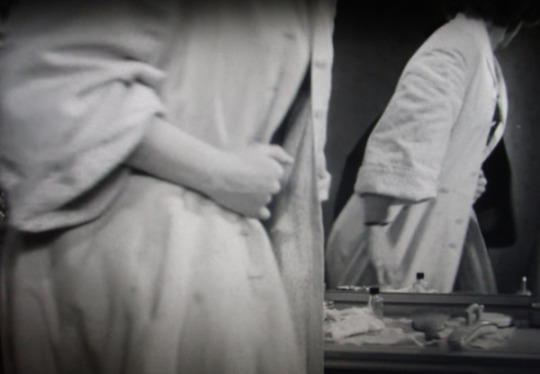
Next day the roaming brother-in-law bests Eugene at shooting targets at a bull’s-eye. The unflappable intruder sees no need to be modest about his shooting. “I can crown myself champion now.” (Champion of what? Champion of destruction being too gutless to grow up? Certainly being useless in managing dynamics.) Earlier that day, Rakel had mastery of their sailboat. An athlete, but incomplete. Eugene is surprised to hear that Rakel was skittish in a blustery sea. Over drinks she smashes her glass. “It’s disgusting, disgusting, disgusting…,” she shouts. (Eugene is alarmed.) She asks Kaj, “How can you? What kind of a man are you?” His response is spot on: “A bastard, like everyone else. Nothing.” She counters, “No, you’re a coward. A terrible coward.” (A moment to savor a hilt of human corruption.) On the winds of her courage, Rakel flashes out, “That’s why I’m going to tell Eugene that we cheated on him today… You think I enjoy sleeping with you, don’t you? Because you’re a nice, talented and considerate lover. But let me tell you something, Kaj. You disgust me. And you’re not a good lover… You only love yourself. Only yourself, and nobody else in the entire world. Only yourself.” He retorts, “If I’m disgusting, so are you, my dear, Rakel. (Bergman in full flight. A nuclear meltdown, as only he could frame it. And a toss away of melodramatic hopelessness. All in the service of taking the step away from dotage to religion and science, and their pedantry, their advantage and their flaming cowardice.) The incestuous patrician insists, “You needed that. Eugene always denied you.” (Maybe he didn’t find intercourse the most important thing in the world.) “And I gave it to you. And now you mock me afterwards…” (A case for an ombudsman?)
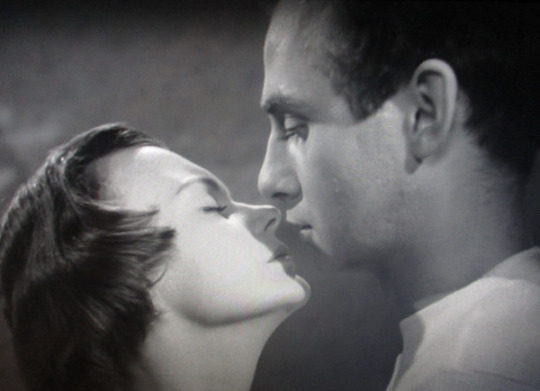
The aftermath comprises a triumph of sorts, in making what some folks call reality. “You slept with him?” the bookworm asks./ “Yes, Eugene, I cheated on you. And I’m not asking for your forgiveness.” Eugene’s fragile notion of pedantry does not stomach full bore errantry. “You have destroyed my entire existence. You, the only person I ever trusted.” He swings into divorce matters which do not maintain the pepper. “The one thing I can’t stand is to be exposed to others” [to fail in pedantry and advantage]. He suddenly covers his face. Rakel kneels by his seat. “What is it? Can I help you?… Can you realize that we have to try and get through this together. We have to forgive each other. I know we can, if we want to, you and me.” (His mind turns to, “I should probably have a talk with Kaj’s poor wife. It’s unnecessary for her to walk through life unaware, like I have.”) “Don’t do anything you might regret.” At this point we have an impressive form of blustery sea within their hearts. As to regret, Eugene can’t resist saying, “You’re one to talk! If I wanted, I could kill you. It would feel liberating.”/ She tells him, “You’re just a bastard! I don’t know what’s become of me, but I’ve probably gone mad. Why should I help you? I’m not your property that you can treat as you want.” He rushes toward her. He grabs the gun and runs out to a nature he doesn’t deserve. After a farcical rescue by a more measured soul, the latter floats the dubious notion, “The worst is not to be deceived but to be alone.” As we slog through this hugely presumptions, and not all that unusual family, “to be alone” seems pretty good.
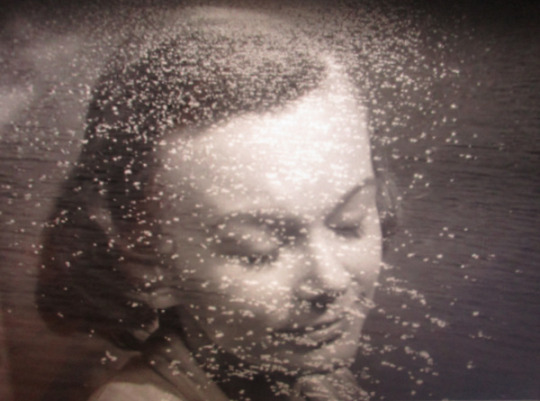
Back in “real time,” Rakel tells the ladies, “We shouldn’t be affected by men’s silly need for prestige and secrecy. We should talk to each other more openly and more often.” As to her unusual background and tastes, discretion reigns questionably. “You might think the story seems ridiculous. And it probably is.” But does “ridiculous” well cover the action. (In another episode to come, at another family gala, the leading light of the corporation is heard to describe Eugene being the black sheep of the family.) Rakel and Eugene subside to near paralysis. But Rakel, the fountain of small gifts, thinks their lives to be quite fine. She’s asked, “Are things better now than before?”/ “Probably not,” Rakel admits, “for Eugene, but for me.”/ “How do you mean?”/ “I’ve come to realize that Eugene is my child… It’s my duty to take care of him. I feel sorry for him. He suffers greatly from what he calls his meaninglessness… Yet he means everything to me now.” The ladies call this “beautiful.” (She adds, “Sentimental, maybe. I don’t know. But Eugene is my meaning in life. We support each other in that way… It’s very simple.”
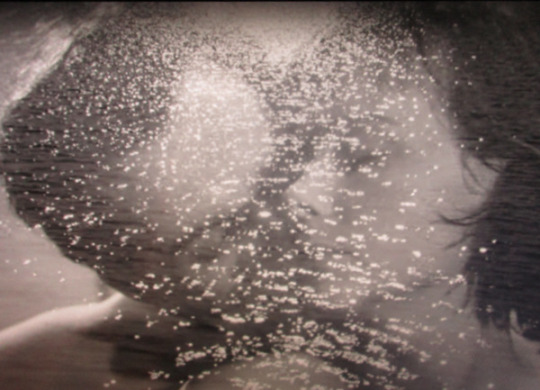
A little turn around the coffee table, and we have Marta, “Kaj’s poor wife.” “Since Rakel has been so brave [another unsound description] to tell of her awakening, I’ll have to show some courage and tell about mine… It was in Paris, three years ago.” Some exacting structure is in play here, due to, not one, but two flashbacks. The Paris incident coming later, while being chronologically first; the Stockholm incident, with Marta in her eighth month of pregnancy to Kaj, coming to us first. Her first statement is well put: “I had suspicions… I was awakened by the contractions…” She drops a water glass and reaches down to her lovely feet and hands. Those digits could be, if not the most, at least an almost equal to the most important phenomenon in sight. But it takes another, more daring, black sheep to make it shine. She primly packs a small bag and a rather large, framed photo of Kaj. (A premature birth on tap.) Someone, at the frosted glass door, appears and disappears. “There had to be an explanation. Yet I was overcome by a paralyzing fear of dying. And my loneliness was suddenly the loneliness of death ” (Many years later, with the film, Face to Face [1976], that apparition becomes active as a black sheep whom the protagonist needs to know well.) The other singularity is her kitten, whom she palms off to the cares of the maternity department. (Never neglect an animal. It’s your better.) The Marta in the film, To Joy, turns out to be overdependent to family ease and middling skill. Already, in this episode, we hear Kaj (AKA, Martin) unwelcome (the message from Eugene). “Don’t you want to answer? You can’t treat me like I’ve committed a crime… Don’t toy with me. I didn’t know better…”/ “You are the way you are, poor thing. I never want to marry you.”
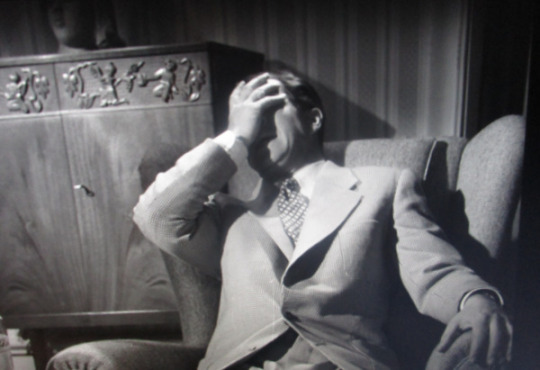
Waiting in the hospital for her baby to come, Marta has a reverie of the Paris days. The shadows of dancing leaves on the wall of her room become the dancing women in the cancan dance hall. “I was in Paris again, and in that awful nightclub.” (Young and snobbish.) Splits; but real splits take more than that. Her date is a G.I. who bores her. She has some trouble getting away from the man’s man in order to win a bottle of champagne by holding her thighs around a two-frank piece. Another rich youngster at the club, namely, Kaj, who, Hollywood style, was her neighbor at the hotel, and easily seen to be more saucy than the date, attracts her that night at the Toulouse-Lautrec shrine. She adds, “The Swedish painter who was always so diligent with his paintings, not to mention being of the same language.” (You can, however, have the same wording, without having the same language.) Back at the cancan, the “diligent” had sent a server to her table delivering a becoming sketch of her and the stiff being a Rocky Mountain goat. (Always about advantage.) Marta, from her poor little rich girl perspective, opines, “I had to admit that his indifference toward me irritated me…” (“He was cute.”)
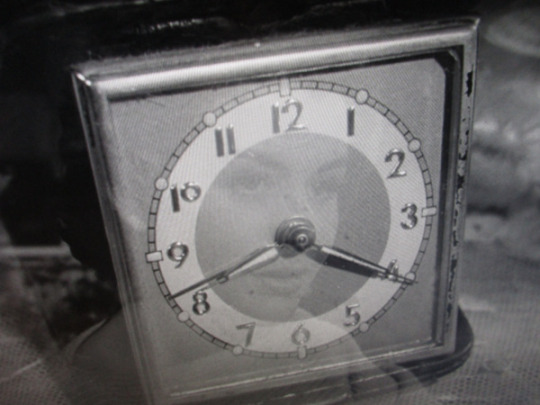
From there, we have an episode inspired by Audrey Hepburn. She ditches her overreaching date by escaping the parked taxi in leaving the champagne bottle on the street to lure him being left on the pavement, while she returns to the cab and the hotel of the “cute” stranger, the strange romantic. Reaching her bohemian vantage point, we notice the hotel’s name, “Le Tournant,” (the turning)—far more complicated than she had ever imagined. (The enterprise next door to the hotel is called , “singed chops.”) Passing the landing, she enters her room and finds that the lamp doesn’t work. Darkness that she could never have imagined. (She tries a second lamp, only to find nothing—her future.) Moving to the window she’s confronted with a fantasy moonlight. (The moon, a bright curtain and Marta. A task of friskiness never touched. Nevertheless, she raises her arms in some kind of triumph.) That was the moment for Kaj to pounce, carefully. Something comes under the door. She grabs the paper and hears the beginning of his orders. “Open the door, but only a crack.” He presents her with a glass of wine. While she sips her wine, he recites a poem. “Marta is a blossoming tree. She is as bright as a little fish./ Why are your eyes so sad, Marta?” (Perhaps the touch of moonlight presented a problematic he would never know, being a confirmed “Nothing.”) “Your true love is sitting outside, rippling your door in the flickering moonlight./ Right now my love has no limit. Yes, eternal is my love at this moment…” She feels that her unique daring has begun to reap its rewards. (Advantage all over Paris.) “Let me be,” the dubious friend gushes. “Let us play in front of the poor, the sick, the terrible… Let us play in front of death itself… My sister (sic), my bride, my blossoming tree.” He adds some fiddling on his guitar. Then he presents her with a small sculpture in her image. She ventures into the dark hallway, where his hand is illuminated from a strange source, and the arrogance from him, as supported by her, begins the train wreck.
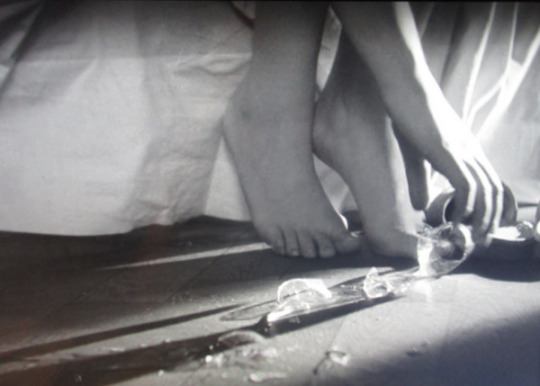
The whirlwind romance is not without rare beauties of the City of Light. Despite their various superficialities, a strain of ambiguity gives them a fleeting pass of frisson. They begin their tour at Sacre Coeur Basilica and its links to real art. The alphas commandeer a horse-driven cart, setting off their march to the Arc de Triomphe, where serious sacrifice may be noticed. The play of sunlight and shadows from the foliage institutes something deft and loving, far beyond their concerns. At a stand of large, magnificent trees two dead presences along the Seine where they had rented a rowboat. At a lull for a nap in the bottom of the boat, Marta’s thoughts return to her other adventure. The preamble of the departure finds her leaving a gynecologist’s with a big smile on her face. She’s close to the river and immediately goes up to a baby and her mother, enjoying a warm, sunny day. She smiles to the baby, and the baby smiles to her. But when an elderly man also enjoys the company of the baby, Marta, losing her sense of priority, quickly leaves with an angry look. (At the end of the film, we’ll find Marta making a disinterested, generous decision. It is the capacity to make such a gesture, after many faux pas, which matters in this saga of dynamics, where families don’t count. On the other hand, we have the inexplicable mystery of the vanishing of Marta’s child. At the outset of her episode, Marta’s parents are mentioned going on a vacation. Do they cover that drama?)
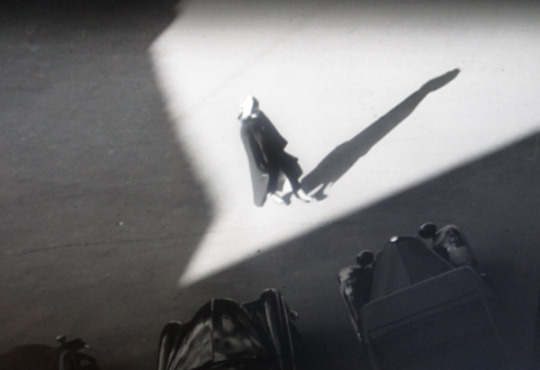
The two are routed by the “iconic” family. (“Martin has chosen the wrong occupation.”) Marta, lost in the shuffle, chooses not to tell of their baby. The sweaty arts at the maternity ward now take over. The waterfall on the Parisian canal reshapes to the birth. Filtering out the strong from the weak becomes a labor that never ends. The nurse encourages Marta to count to five. Another venture consists of that figure at the door, only for grown-ups. (Her baby seen trying to fathom her mother. Squeezing her face. Kaj joins in. He kisses her.) Marta’s baby at the maternity ward. She glowing… First simple moments of a long, difficult life.
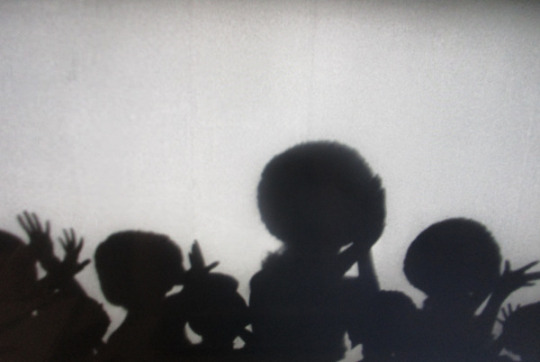
Back at the coffee table, a perception- deficit looms. “That was a real nice story.” (The flashback of this depressive romance is not only outrageous, but it’s lacking in strict temporality.) The matter is saved by adding, “But why did you end up marrying Martin?”/ “I love him.”/ “You should have lived on your own with your child and fought for yourself. That would have been style!” The opinionated speaker is Maj, Marta’s young sister. She continues, “You ruined it by compromising.” The jumbler argues, “Life isn’t so stylish, dear.”/ “Life is what you make of it.”
On that note, Karin, wife of the CEO, prepares the women for not having much to tell, but being funny, not a dramatic discovery. At a centennial gala of the corporation, with the Crown Prince in attendance, Karin approaches Kaj, “How’s your wife?” He corrects her, “She isn’t my wife” (technically). One of the other women had remarked she saw Marta in town and she looked to be in the last month. That elicits from the non-black sheep, “So what! She doesn’t care about me. She won’t even talk to me on the phone. I’ve begged her to marry me, but she doesn’t want to. Can you believe it? She says that I’m incorrigible. She won’t even give me a chance.” That was one, inflected, dead-end. Here comes another.
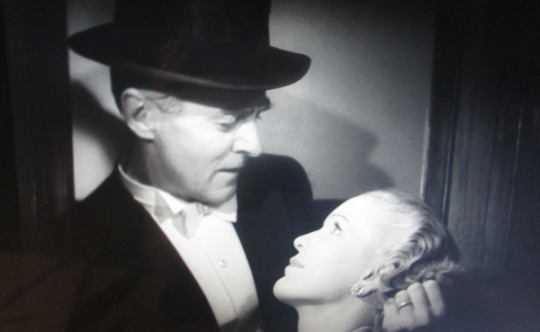
Karin (on the way home) is driving, due to her husband’s having had quite a bit to drink. From the back seat, Fredrik discusses his understanding of “style.” “I’ve made Father’s company into a worldwide organization, which we own 79% of the shares. Personally, I am in the prime of my life, full of job satisfaction, energy and great ideas for the future which appears quite bright… I’m revolutionizing our export industry… I’m a little drunk…” (Karin, played by actress, Eva Dahlbeck, had also played the part of a high spirited and very limited wife to a renowned gynecologist in the film, A Lesson in Love [1951], where her husband was played by actor, Gunnar Bjornstrand, who takes up the role of Fredrik here. She being perfect to tell the 79%, “And you don’t have any friends, either.”) Cruising on, the millionaire brags, “I sleep well. My stomach’s fine [a touch of irony]… Good teeth… It is as if annoyance abruptly fled the moment I showed myself…” She inserts the motion of irony when responding, “You truly are exceptional.” He takes the route of great geniuses, when using the cliché, “No man is great in the presence of their wife.” She ripostes, “God is probably not married.”
That kind of contention will flow beyond the drive and into their elevator, which promptly breaks down. In addition to various slapstick routines related to attempting to escape the little jail, some personal issues of note get illuminated. By way of a profound rubric, we are eventually provided with the repair man telling Fredrik, “The distress button is broken.” The man who will tell you he is always right makes a big mistake, in broaching the matter, “Have you ever been unfaithful to me?” Karin, the wit, of course, would have to say, “Sure,” leaving him to ask, “Really?”/ “And you acknowledge it, just like that!”/ “You asked me.” He goes on, “Has this occurred often with different people?”/ “Yes, of course. What did you think?” Fredrik asks, “Do you have a lover at the moment?” She explains, “I have two, but I don’t know which one to choose… Exciting, don’t you think?” Fredrik becomes annoyed—“I am still your husband.” This opens the question for Karin to ask, “How many times have you been unfaithful to me?” She points her finger at him, and the tone, “the style,” becomes dark. He refuses to touch such a matter, being so remote from his integrity. But that doesn’t stop him from declaring, “I have never been unfaithful to you.” Karin, trying to defuse a moment far from her best, tells him, “What I said was just in fun.” But Mr. Perfect pounces to the tune of, “You don’t have any proof.” This overbearing thrust by him causes her to look for blood. “Actually, I do” [have proof]./ “What?” he challenges./ “Now you’re scared, aren’t you? Well, well, well!” (Cut to Fredrik, shocked.) She hasn’t any more playful style this long night and, after hearing him sneer, “I think you’re bluffing, dear,” she replies, “I’ll just say a name… Diana.” (He sits down, deflated.) She sneers, rather tritely, “He’s blushing like a schoolboy. A little boy caught with his fingers in the cookie jar…” (Advantage without tempering.) His adjustment is, “She was crazy, so it ended very quickly.” Karin adds, “Did you know that that 19-year-old American put two detectives on you? For two years, she watched your every step.” That Karin overdoes the facts—”all your adventures over the last two years… I have the list here in my purse”—becomes, rather than a little joke, a (momentary) trajectory for severing their relationship. He tells her, in this desperate embarrassment, “Almost every episode I’ve had has been fun. I’ve never regretted it. Each of us lives our own lives.”
His leg cramp and her massage is all it takes to recover their famous love. A policy of ironic generosity has reinstated the powers they live for. They live for being two disparate vehicles. When the morning arrives, the custodial crew and a few of the cleaners laugh as the elects ascend to their penthouse.

One other constellation, very unlike those who have shown us the sadness of the weak, bring to us their readiness to meet a new day. Coming to us, first of all, after the story of the plight of Marta, the girl chasing “style,” namely, Maj, is now accompanied by her boyfriend, Henrik, calling her to go out the open window and go a long way. Henrik had just been told by the family high flyers, who shut the door upon Kaj’s surely hopeless arts dabbling, that he was to enroll in a business program at a university. He resolves not to pursue what he might meet in the way of constrictedness (but, on the other hand possibly something quite fascinating). His plans had been to see what the wide world meant. Only running away from the overrated family could fit the bill. Of course, Maj would be his soulmate in plumbing the ways of style. In the confusion of the arrival of the menfolk’s dispensing with introspection (Marta, in a distant shot, passionately hurling herself upon the widespread lover), Marta rushes upstairs to put on better clothes, where she bumps into Maj packing her bag. The brush goes like this: “Are you going to stop me?”/ “Yes, I am.” / “With force?”/ “If necessary… I’m responsible for you.” Maj moves the action to better focus: “Should you talk about responsibility when you’ve been so irresponsible and done so much?”/ “I beg you, Maj…” / “I don’t care. I know what I want…” After a pause, they embrace. After a glitch with the motorboat, they move for their moment. (Cuts between a noisy dance party and the dark, silent waters.) En route, they do have something to say, particularly Maj. “Swear that you’ll always love me as much as tonight.”/ “I swear.”/ “Swear that you’ll never compromise, never stray, never lie, cheat or behave like everybody else.” / “I swear…”/ “Because otherwise we might as well be dead…” Cut to Marta on the veranda, speaking with a quiet reveler who notices the distant departure. She tells him, “They’ll be back in time.” (She covers her face. The water is calm. She is not.) She tells him, “I’m just so happy.” (Yes and no.) A last look at their boat, about to test their seaworthiness, their style, which could mean they won’t be back, pending a ripple of play with nature itself, and an integral play of attending to creature comforts.
0 notes
Text
on the beauty of poetry- Lorenza de la Torre
I am sitting here, wondering about poetry. Why is it here? What does it mean? Is it really needed? All these different questions that no one knows the answer to. How can I, a 16 year old, know how to define what poetry is and what is its impact on our society? However archetypal this may sound, one can’t define poetry. I mean, poetry isn’t just a couple lines on a piece of paper that illustrate symbols, metaphors, personifications and whatnot. If we really look hard, humanity can find poetry anywhere they look. May it be a decaying tree, human resistance, or a mother carrying their child, poetry is part of our everyday life. Poetry comes in many shapes and sizes, it could be something repulsive, ephemeral, or simply beautiful.
Beauty. This is the very word that I will be trying to define throughout this text. Why would I choose such a conventional and vague topic such as beauty? Beauty, like poetry, is easy to find, depending who you are. Now I, someone who I believe to be quite buoyant, finds beauty everywhere. However, I do believe that the word in itself is overused and in this day and age, the age of technology and selfies and social media, this specific word has lost all its meaning. Yes, I know, that was a very radical statement, but everytime I walk out on the street, I cannot escape the words “Oh my god! This is beautiful!” “You’re beautiful!” “I am Beautiful”. People saying it constantly that the word means nothing to them, but they wouldn’t know.
As I have done with multiple other concepts, concrete and abstract concepts, I looked into the past. I would consider myself a golden age thinker. Someone who despises the time that they are currently in, wishing that they can go back in time to when all their amount of personalised and relative fun was happening. I would rather be hanging out with the beat poets, or debating with Albert Camus, listening to the amazing, innovative music from the new wave eighties, or even contemplating what art is with Oscar Wilde, than sitting here, watching people only care about their appearances as they take another meaningless selfie on their brand new iphone.
The main question I asked myself is how did the concept of beauty evolve through time? One view on beauty from the Antiquity being that Socrates believed in the rejection of the human body and that the concept of physical beauty meant nothing. However, Nietzsche stating that this was because he was an ugly, repulsive man. Kant, on the other hand, stating that in some way real beauty doesn’t exist, that beauty only exists in order to please man. Oscar Wilde, with his aestheticism, putting beauty above anything that has a physical impact on humanity like politics or social position; because, ignorance is bliss. People’s concept of beauty is relative, one thinking that it is only accessible through human proportions, and other’s, like Wilde, thinking that it is the world around us. The environment in which we find ourselves. It sounds like an “easy way out” answer to a complicated and complex question, but each person's view of beauty is relative to who they are. Who they are being formed by multiple factors such as social position (Wilde, a dandy, found it everywhere), personal physical appearance (To Nietzsche, Socrates denying beauty because he was simply unappealing), personal history, and general context.
People’s relative stance towards beauty has led to many different essays, novels, and poems about said subject. An outsider’s view towards poetry is that every single poet writes about beauty, or a “fair lady” that they have met in the past. However, many different poets portray their different stances on beauty with their poems, views that were even frowned upon in the society that they lived in. Shakespeare, putting his love before the physical beauty of the woman in his sonnet “My mistress’ eyes are nothing like the sun” to Baudelaire and Wilde comparing a decaying, dead, body to an angelic and pure object. Beauty, in poetry is used as a door into the poet’s perception of what they value the most, physical or spiritual. Moreover, their perception, enlightens, informs us, and helps us form our own personal view towards such an abstract concept. Beauty and poetry also go hand in hand. Poetry in itself being something beautiful, throwing a positive light on human emotions. Without beauty, whatever it may be, there would be no poetry, and without poetry, there would be no beauty. They are co-dependant notions that make life opulent, worthy.
Now, is poetry needed in our society. People who say that it isn’t, I believe to be quite naive and ignorant on what poetry truly is. As I illustrated previously, poetry is not a text on a piece of paper, poetry can be found everywhere, if we look hard enough. So to say that poetry is inexistent, and has no necessity in life, would be just plain incorrect. However, I do believe that the youth of today might seem to be unappreciative of the conventional definition of what poetry is. My generation, the “youngsters” of today simply don’t read as much as before, because we have technology, social media, Netflix, Youtube, whatever that keeps our minds and bodies occupied that promote the least amount of activity. Yes, I am calling my generation lazy. However, this rejection of written poetry has opened us to concentrate on a more unappreciated form of poetry: music. Music today plays the role that novels, and poetry played back in the day when music was only for the elite. Ever since the beginning and most importantly, the second half of the Twentieth century, music has assembled both lyrical and instrumental talents to make us feel rare emotions, that we wouldn’t encounter without it. For example, we have the 80’ band The Smiths, whose innovative guitar and intellectual lyrics sprouted a group of young adults to think for themselves, and continues to do so. Patti Smith, whose literary idols include Arthur Rimbaud, and Baudelaire, copies their style and writes through their perspective of the world. Music for the Masses. Music makes poetry available to people who wouldn’t have access to the sometimes superficial, written poetry. Could someone survive without poetry? I don’t think so. I stated that I believed that poetry could be found anywhere, so it would not be plausible to never encounter poetry, even if we are not aware of it. But music, makes poetry so much more valuable, especially to the young generations of today. Many people escape the world through their headphones, and get lost in the music. Today, most people listen to rap, in itself a very poetic form that is very attractive and enlightens the youth without them knowing it.
How could I illustrate to you, dear reader of the importance of poetry in our society. We need it. We can’t just go along living our lives without it. Art is needed, litterature is needed, and poetry is needed. In whatever form they might be in. Ever since the beginning of intellectual curiosity, so the Antiquity, poetry has been illustrated as a way to express emotions, everybody’s personal humanity. In my opinion, the meaning of life is to find happiness, whatever that may be. It’s all relative. In order to find happiness, one must “find themselves”. We need a cheat sheet, an opening to other people’s minds to show us the right path. And poetry is the perfect way. Poetry, through music, visual arts, human actions, gives life a meaning and a goal. To find the beauty in this world that might seem to be the opposite.
3 notes
·
View notes
Text
Dread and Hunger: Ch. 3
Chapter 3: Sauvignon Blanc
When another body was reported on the Tri-Delta lawn, the school had a meltdown. Classes were cancelled –much to Beverly’s dismay since she was right in the midst of a fiber analysis breakthrough –and everyone hovered in groups in order to make plans for vigils and for better security. Will sat at one of the benches nearby, watching the spectacle of teachers attempting to console and wrangle in the hysteria, all the while their own sat perched just underneath their chins.
This time, he had no doubt this kill was for him.
“They said it’s the Chesapeake Ripper,” Alana said, arms folded across her chest. She was one of Will’s few friends, in the midst of her graduate program, her backpack stuffed so full of books it was a wonder she didn’t topple over.
“It is,” Will said, staring at the corpse through cuts and breaks of the living bodies milling about.
“What makes you say that?”
“He’s a poet –can’t you tell?” Will glanced at her wryly, and she cracked a tense grin. She was no more comfortable around dead bodies than other people were. “This is Hades tricking Persephone to Hell.”
“I’m familiar with the story,” said Alana, and when a teacher managed to lead a group of students away, she sat down beside him. How she wore heels in the middle of campus, he didn’t know, but he did commend her for it. Struggling through wet soil in that sort of shoe seemed a punishment to him, but to each their own. He studied the patent leather for a prolonged moment before looking back to the woman posed in such a grotesque fashion.
“Behind her, he planted flowers, but the gaping black maw he created between those two trees represents Hell. The branch in the shape of a hand reaching through is Hades.”
“Why did he use a branch for Hades' hand rather than another human hand?” Alana wondered. Will shrugged.
“I think that’s his hand. The branch was moved and trimmed but not killed from the tree. He says he represents the life in the darkness, so I don’t think he’d want a dead hand for that. He’s leading Persephone into what, to mortals, is the worst of places to be, but we all know she ruled Hell after getting there. Hades paved the place before her to be a queen.” Will swallowed heavily, his palms clammy against his jeans. Nervously, he drummed his fingers.
“So you think that one psychiatrist was right? Dr. Chilton claims the Chesapeake Killer is in love.” Alana wrinkled her nose in disgust at the thought, and Will twitched his shoulder in a shrug. He noted the FBI agents moving about, and that was even better confirmation than his own thoughts or Dr. Chilton’s news analysis.
“He even found the right dress to put her in. The right floral crown, the whole…set-up. He’s detailed. A romantic.”
“Are you impressed at his care, or are you horrified you can see the care he put into it?” Alana asked lightly. Will tensed, looking to her knee cap, then to the ground where her foot rested. Although they’d never talked about his mind very much, out of her respect for their friendship, there was a reason Alana was the top of her class. She knew without him ever having to say a damn thing.
“Both,” he admitted, and he scratched the back of his neck.
“Seeing and understanding doesn’t make you the same,” she assured him, and she lightly patted his shoulder, squeezing it.
“I know.”
“I know you know, but as your friend I’m making sure that you know I know.” He laughed at that, standing up when the sight of Persephone’s curly brown mop of hair was too much for him. That was the only inaccuracy to her appearance, and it was enough for him to solidify the kernel of truth that he’d been wrestling with for a few weeks now.
The Chesapeake Ripper was interested in him, for reasons he was too terrified to know.
-
There was a letter waiting for him when he got home, and he snatched it from the floor of the apartment hall with a vengeance. He let his bike fall onto the middle of his apartment floor as he hurriedly locked his door behind him, and when he sat down at the table, he opened it with shaky hands, the heavy paper supple and smooth. Out of the envelope, seven seeds fell, and he stared at them on the cheap wooden tabletop before he unfolded the letter, swallowing convulsively.
Dear Will,
You bring the light clasped round you, and although
I knew you’d bring it, knew it as I waited,
Knew as you’d come that you’d come cloaked in light
I had forgotten what light meant, and so
This longed for moment, so anticipated,
I stand still, dazzled by my own delight.
I see you, and you see me, and we smile
And your smile says you are as pleased as me
With everything and nothing still to say
All that we’ve saved and thought through all this time
Boils down to affirmation now as we
Stand here enlightened in my realm of grey.
Yours,
-C.R.
He shook his head, but the words remained the same. A steady thrum of pleasure snaked down his back and, with a groan of disgust, he tossed it to the center of the table where the other poem lay. Poetry? The Chesapeake Ripper was sending him poetry? Two bodies could now be said to be equally his blame, since something about him had made the Ripper want to…well, rip. He dragged his fingertips over his eyelids, rubbing them until galactic spirals churned in his vision.
He couldn’t stay in his house like this. Like Dr. Lecter said –friends were supposed to be your stability.
Perhaps that was what had him out at a club that was certainly not his style that Friday night, seated at the bar while Beverly, Alana, and Alana’s girlfriend, Margot, danced to a syncopated and too fast beat. Beside him, Brian Zeller took a rather large gulp of his beer, spinning on the stool to watch them.
“This was a great idea,” he said to Will, motioning towards Beverly. “She’s pissed they won’t let her finish her work, so it’s going to sit there all weekend because the school insists we aren’t there.” Brian was a good friend of Beverly’s since they were both studying forensics with sights on the FBI. While sometimes Brian found Will to be all but intolerable, Will found that his presence was certainly tolerable enough. He wasn’t Beverly, but he’d do. He needed the noise, the alcohol, and the feverish high that places like this brought in order to get rid of the image of Persephone reaching for Hades’ hand on the middle of the Tri-Delta lawn. He wondered if they’d dig up the flowers the Ripper had planted, or if they’d keep it as some odd memento. He wondered if they'd give him one to put into a terra cotta pot.
“I thought she could use it,” he said over the beat. He sipped his whiskey, pleased that he’d caught the woman in time before she’d given him bottom shelf well water instead of something smooth. Once he’d told her he bartended, she was quick to give him middle shelf, which was all a guy could ask for.
“This isn’t your scene, though, right? I mean, you’re not going to go try and…” Brian laughed and motioned towards the dance floor where several men lurked, attempting to find ways to ingratiate themselves to the gyrating bodies. Will shrugged, eyes leaping to the flashing, seizure-inducing lights.
“You can, and I won’t judge,” he promised Brian, and that’s all that Zeller needed to hear. He was gone after he chugged his beer down, and he worked through the crowd in order to get to where their friends were, moving to the beat.
Time crawled, though. While they moved and shifted and bounced about to the ever changing songs and sounds, he took drink after drink until the sweaty air became too hot, the stool beneath him too unstable. Will paid his tab and stumbled from his seat, unable to find his friends but more than able to find a side door out into an alley. He gulped in the cool air, and he wiped his forehead, leaning back against the brick and closing his eyes to make the world stop spinning for just a moment.
It was at that unfortunate moment that he was grabbed, the world lurching about him wildly as he was spun and slammed against the brick wall face first, making spots of starlight explode in his eyes.
“Fuck, what are you-”
“Sh,” the person said, and Will froze as the assailant pinned him against the wall from his knees to his shoulders, their body flush against him. He thought to shout out, to resist, but against the side of his ribs he felt a thin, deadly pressure, and his drunken mind said that yes, Will, that was indeed a knife. People with knives pressed to their skin didn’t shout or resist because they weren’t stupid, and you’re drunk but certainly not stupid.
Right?
“Don’t move.” The voice was low, gravelly. Will froze against the wall, although he had it in him to nod so that the man knew he was going to comply. Was he being robbed? He didn’t have much since he deposited his tips into his account as soon as possible, but there was at least twenty bucks in his wallet.
He didn’t go for his wallet, though, pressed so close as they were. Will knew that he was burning up from the alcohol, but that paled in comparison to the heat that radiated from the man, something that scalded his skin and pierced deep. Against his back, the man’s heart beat at a steady, regular interval, and Will knew this wasn’t the first time he’d handled another person so violently.
The man's hands began to move slowly, leisurely. They trailed along the side of his thighs, his waist, his ribs. When they reached the juncture between chest and arm, they slid over his back and splayed across his shoulder blades, the small bump in the spread informing Will that he was dragging the knife along, too. He held as still as he could, breaths turning into gasps, transforming to wheezes. He was going to die. He was going to die drunk outside of a club in an alley, then what would the Chesapeake Ripper say?
The man’s hands glided over his shoulders, then jerked him from the wall enough that he could slide his hands down his chest, across his ribs. Even with the space provided, he didn’t feel like he had an out. The man’s chest was pressed flush against him, his arms an iron cage. In the darkness of the alley, he could only see shapes, distinctions of where the knife was separate from the hand, and when he paused on Will’s heartbeat it doubled in time, alerting his attacker that he was utterly, utterly terrified.
The hands continued their investigation, gliding across his stomach and abs, hesitating at the waistline, pausing just above his jeans. He gulped, and the man’s hands drifted down, stopping just at the point where his hand rested right on top of Will’s member.
“Please don’t,” he said quietly, and the man applied pressure, rubbing the area in slow, massaging circles. Will shuddered and his head fell forward so that it could press into the brick, a sharp breath hissing from his lips. The man behind him hmm’d thoughtfully, and he pressed his nose and mouth against Will’s neck, inhaling deeply.
He felt when it began to become aroused, tightening the material of his jeans, and the other man felt it, too. There was a disconnect, a whisper in his mind that reminded him that physical reaction was not a true sign of arousal, that the body naturally reacted to stimulation. When the man bit down on his neck and sucked lightly, though, the thought swept away from him, disorganized and chaotic in the rush of pleasure that made his knees weak. This wasn’t right; this wasn’t right.
It felt pretty damn good, though.
His breaths became pants, his member straining against the material. The man gripped it tightly, squeezed, and he moaned, leaning back against him. The man’s free hand wrapped tightly around his chest, holding him back against the erection he could feel pressed tightly to his rear.
A door slammed to the side of the club.
The man shoved him, and he fell against the brick wall, his breaths escaping in quiet, muted gulps. Footsteps rushed away from him, and when his mind made the connection to turn and look, there was no one there. He blinked, stared at the empty alleyway, and when he finally got his legs to cooperate, he found his way to a taxi and slid into it, rubbing his neck where the assailant had left their mark.
-
The next day, well after he’d dry-heaved into the toilet and scrubbed the taste of day old whiskey from his mouth, he savagely tore open the letter that waited on his doorstep, innocent and lovely with its curling script and cream paper. This time, it was gravel that fell into his palm, and he knew without having to truly know just who had assaulted him in the middle of an alley in DC.
Dear Will,
You really must be more careful where you go so late at night. What if I had not been the only killer in the alleyway? What would you have done, then?
Yours,
-C.R.
-
“You look far more tired than usual, Will. How was your weekend?” Hannibal saw all, it seemed. Will set his drink down, a Sauvignon Blanc, and he rubbed the lack of sleep out of his eyes.
“Pretty hellish,” he admitted, then rebuked himself. That wasn’t something Hannibal Lecter had to know. He was a customer, for Christ’s sake.
“More letters from your admirer?” At his gesture to sit down, Will took it, glancing about to make sure no other customers were about. Sangre wasn’t a popular place on a Monday at 4:00 P.M., which is probably why he was stuck with the shift. New blood got the worst shifts.
“And what I suspect is a body, but I can’t confirm that,” he said, and admitting it out loud was like spitting acid onto the table before them. His fingers tapped out a tuneless beat on the server tray, and he held his breath. Should he tell Hannibal that he’d been sexually assaulted? He’d considered going to the cops, but his classes and experiences told him just how futile that adventure would be. Women who’d been raped or assaulted faced a gauntlet of horrifying and accusatory statements, and men were faced with a blank stare of utter disbelief. Men weren’t sexually assaulted. Women mostly lied about being sexually assaulted.
He’d firmly decided against filing the report.
“It is interesting that this person has chosen you,” Hannibal said, tilting his head. “Why do you think that is?”
“He thinks…I can connect with people on a level beyond human interaction,” Will said slowly. Don’t give it away. Don’t give it away. “But I’m sure that I upset him the other night, so I may not hear from him ever again.”
“How did you do that?” Dr. Lecter asked, intrigued. His eyes lightened perceptively.
“Are we going to start calling these therapy sessions, Dr. Lecter?” Will replied dryly.
“These are mere conversations between acquaintances,” Hannibal replied genially. He inhaled the bouquet and smiled appreciatively at Will, nodding his approval. “Some would argue this a more of a summer wine, but I enjoy the freshness of it.”
“I thought something light for the day,” Will said. Something light while discussing something dark.
“A lovely thought. But do go on.”
“I went out with friends to a club they like, and I got a little drunk,” Will revealed, rubbing the back of his neck. “He basically informed me that he didn’t like that.”
“Are you so sure it’s a he?”
“If the murders that are correlating to the letters are him, then yes.” He thought of the muggy, cold air that’d collected in the space around them, the heat that’d burned his skin. That was no woman that’d pressed him against the wall.
“He feels entitled to where you go and what you do, then,” Hannibal observed. “Why do you think that is?”
“Obsession,” Will replied automatically.
“So you believe this person is obsessed with you?” Will shrugged, a non-committed gesture.
“He’s obsessed with some part of me that he thinks he can see, but he doesn’t really know me. He’s never spoken to me, but he’s made assumptions, and he’s obsessed with those ideas.”
“By your logic, then, if he did come to know you, would it cease to be an obsession? Would it transcend to something more?” Hannibal wondered. “You who looked at the murders that you feel are linked to this admirer, you assumed to know of them the way this admirer assumes they know you. In your own way, does that make you obsessed in some form or other?”
“I only looked to see after their deaths correlated to me, though,” Will protested.
“Then perhaps the obsession is with yourself, that you see someone kill another and suppose it has anything to do with you,” Hannibal replied with a sly smile.
“…Maybe,” Will said reluctantly.
“Are you, perhaps, upset that he didn’t ask permission before sending you such letters?” Hannibal inquired when Will didn’t add anything. “I should have asked permission as well before engaging in any sort of conversation –my mistake.”
“It’s different with you,” Will said, looking up to his face. “You aren’t running around town killing people just to get my attention.”
“Thankfully,” Hannibal replied gravely. He maintained an intense, searching stare, and the longer Will looked, the more he found his breath coming somewhat short, wanting.
Wanting what?
“And…I like our conversations,” he added a beat later. He looked out of the window where passersby hurried through whatever errand sent them scurrying so quickly. He felt Hannibal’s stare on his skin like a stain he couldn’t quite scrub off, and he wasn’t sure whether he should elaborate or slink back to the bar where he’d pretend to wipe it down for a little while. Hannibal busied himself with enjoying the wine, and that was enough compliment for him.
“I enjoy our conversations as well, Will,” Hannibal said at last. “Despite your reluctance for any interaction with others, once you put aside a refusal to be anything more than professional, you’re quite adept at socializing with people, as adults are wont to do.”
“My refusal to be anything more than professional?” Will asked, eyes flickering to Hannibal’s lips. They twitched.
“Oh, yes. I could see the fear in your eyes, at first; God forbid we became friendly.” It took him a second to realize that Dr. Lecter was teasing him. Will smiled wryly, and he looked to the bar, giving a start when he saw his boss. He stood and held up the server tray, akin to a shield, and he nodded to Hannibal, as professional and aloof as he could make it.
Whether his boss bought it or not, that much was uncertain. Hannibal left a generous tip, and Will was left with an odd feeling that made his bones press tight against his skin.
#Hannibal#hannibal fanfiction#hannibal au#hannigram#Will graham x hannibal#murder husbands#LiaS scribbles
2 notes
·
View notes
Text
Book #7: True Hallucinations
It's only tea leaves
Stop being dramatic
Next thing you'll be saying that I've been
Hallucinating you all along
- Apophenia, They Might Be Giants
■
True Hallucinations (1994) tells the story of how Terence and Dennis McKenna, along with three others, ventured deep into the Amazon rainforest in 1971 to La Chorrera, to do psychedelics and discover the metaphysical-extraterrestrial-spiritual-existential mysteries of the alternate dimension inside our minds.
Dennis McKenna buzzes three times at a mushroom, and becomes a shaman for two weeks. Terence is totally into this. They have telepathic communication, time-traveling phone calls, alien encounters, metaphysical journeys, the whole works.
You see, Dennis' buzzing harmonically resonated with the drug molecules, allowing them to bind with his DNA due to electron spin resonance thus stabilizing a superconductor and unlocking the collective memory repository of his genetics and tapping him into the galactic consciousness.
Eventually he returns to normal and doesn't remember or particularly want to talk about what happened to him. Terence is sure this was a brush with hyperdimensional superintelligent machine chemist elves, and has spent his life since refining his time-wave synchronicity theory to predict the end of human history, when the secret mushroom hivemind aliens reveal themselves and things change forever.
---
That's basically the book. I'm being a little uncharitable, but not very much.
I read this book to answer the question, "What does it feel like to be one of those people who takes drugs and thinks that visions of alien saucers and remote-viewing sex-slime (yes, seriously) have imparted the secrets of the universe to me?" And the answer is that it basically feels like being an Unsong character. Everything matters, everything is connected, nothing is a coincidence, if it feels important it is important, and taking drugs does not reduce your reliability as a witness.
To his credit, Terence isn't stupid, or even anti-science per se. He explicitly says he wants people to try and disprove his time-wave theory, in keeping with scientific methodology. The problem is that this is sort of like asking people to disprove that colorless green ideas sleep furiously.
Terence even states, in as many words, that his willingness to believe everything Dennis said at the time was unreasonable.
I had passed from weary, disgruntled skeptic to ecstatic believer. Looking back on it I believe that, for me, this was the critical juncture. Why did I not question Dennis more closely?
Was I somehow self-hypnotized? Did the unfamiliar setting, the restricted diet, the strain and expectations push me into a place where I was unable to resist participation in the world of my brother's bizarre ideation? Why was I unable to maintain my detached and skeptical viewpoint? In some sense this willing suspension of disbelief is the crux of the matter—and, I believe, of many a "close encounter" situation.
The Other plays with us and approaches us through the imagination and then a critical juncture is reached. To go beyond this juncture requires abandonment of old and ingrained habits of thinking and seeing. At that moment the world turns lazily inside out and what was hidden is revealed: a magical modality, a different mental landscape than one has ever known, and the landscape becomes real. This is the realm of the cosmic giggle. UFOs, elves, and the teeming pantheons of all religions are the denizens of this previously invisible landscape. One reaches through to the continents and oceans of the imagination, worlds able to sustain anyone who will but play, and then one lets the play deepen and deepen until it is a reality that few would even dare to entertain.
As far as I can tell, this means "yeah I was believing things without evidence, but that's okay because these are the kinds of things you need to disregard evidence to believe." Which is certainly...something.
Like, his brother predicted multiple times at La Chorerra that humanity was about to collectively ascend to a higher plane of being, right now, it's going to happen, this isn't a metaphor the world will end now, and then it just didn't happen. And Terence ignores it!
He even went on to predict the alien mushroom singularity would occur in 2012, and well, we know how that went. (If you're receiving the information encoded in this post through your link to the fungal transdimensional hivesoul, please DM me.)
Terence doesn't seem to mind failed predictions at all, actually, and that's the biggest intellectual mistake I can charge him with.
Like Old Testament prophets or Hellenistic alchemists, we felt that we were caught up in a cosmic drama of fall and redemption.
Four days from the experiment, five, seven, ten, sixteen, twenty-one, forty, sixty-four— all were times awaited with hope and willful suspension of disbelief and all came and went with the eschaton still all-pervading, yet still very elusive. The idea of a dimension-roving lens vehicle, once articulated, was never far away.
■
Though if I'm being entirely reasonable, it's not their failure to change the world in five days in the woods that makes me so confident that basically everything they think is wrong.
Lots of actual scientific revolutions start off as dipshits in the woods with poetry, so that's not super strong evidence against them. What matters more to me is the fifty-odd years since where millions of people do a bunch of drugs and never achieve anything supernatural where it can be verified by anyone who is not on drugs.
Whatever. I shouldn't worry about this stuff too much - it doesn't impact me personally, it doesn't have a lot of political power, and it's not even among the top, like, five threats to most people's epistemology. I should go learn something useful instead. Maybe read a book about, like, web development?
■
Wait a minute. The La Chorrera experiment took place in 1971. Dennis, in his shamanic state, claimed to have immediately ushered in a new era of humanity. I thought he was wrong, since we're all still here and not enlightened.
But something did happen in 1971.
God damnit, Dennis, your hyperdimensional chrono-fractal enlightenment broke the economy!
#books#not a book review#mysticism#effortpost#please do not take the economy joke at the end seriously
0 notes
Text
What is Yoga? Can a Christian or Mohammedan be great Yogi? Is Yoga part of any religion or needs belief in God like religions?
Yoga is not a religion, remember that. Yoga is not Hindu, it is not Mohammedan. Yoga is a pure science just like mathematics, physics or chemistry. Physics is not Christian, physics is not Buddhist. If Christians have discovered the laws of physics, then too physics is not Christian. It is just accidental that Christians have come to discover the laws of physics. But physics remains just a science. Yoga is a science -- it is just an accident that Hindus discovered it. It is not Hindu. It is a pure mathematics of the inner being. So a Mohammedan can be a yogi, a Christian can be a yogi, a Jaina, a Buddhist can be a yogi.
Yoga is pure science.
And Patanjali is the greatest name as far as the world of Yoga is concerned. This man is rare -- there is no other name comparable to Patanjali. For the first time in the history of humanity this man brought religion to the status of a science. He made religion a science: pure laws, no belief is needed.
So-called religions need beliefs. There is no other difference between one religion and another; the difference is only of beliefs. A Mohammedan has certain beliefs, a Hindu certain others, a Christian certain others. The difference is of beliefs. Yoga has nothing as far as belief is concerned; Yoga doesn't say to believe in anything. Yoga says "Experience." Just as science says "Experiment," Yoga says "Experience." Experiment and experience are both the same; their directions are different. Experiment means there is something you can do outside; experience means there is something you can do inside. Experience is an inner experiment.
Science says, "Don't believe, doubt as much as you can," but also, "Don't disbelieve" -- because disbelief is again a sort of belief. You can believe in God, you can believe in the concept of no-God. You can say, "God is" with a fanatic attitude; you can say quite the reverse, that "God is not," with the same fanaticism. Atheists, theists, are all believers, and belief is not the realm for science. Science means to experience something, that which is; no belief is needed.
So the second thing to remember is that Yoga is existential, experiential, experimental. No belief is required, no faith is needed -- only courage to experience -- and that's what is lacking. You can believe easily because in belief you are not going to be transformed. Belief is something added to you, something superficial. Your being is not changed, you are not passing through some mutation. You may be a Hindu -- you can become a Christian the next day. You simply change, you change the Gita for a Bible. You can change it for a Koran, but the man who was holding the Gita and is now holding the Bible remains the same. He has changed his beliefs.
Beliefs are like clothes. Nothing substantial is transformed, you remain the same. Dissect a Hindu, dissect a Mohammedan -- inside they are the same. The Hindu goes to a temple, the Mohammedan hates the temple. The Mohammedan goes to the mosque and the Hindu hates the mosque but inside they are the same human beings.
Belief is easy because you are not really required to do anything, just a superficial dressing, a decoration, something which you can put aside any moment you like. Yoga is not belief; that's why it is difficult, arduous -- and sometimes it seems impossible. It is an existential approach. You will come to the truth not through belief but through your own experience, through your own realization. That means you will have to be totally changed -- your viewpoints, your way of life, your mind; your psyche as it is has to be shattered completely. Something new has to be created. Only with that new will you come in contact with the reality.
So Yoga is both a death and a new life. As you are you will have to die, and unless you die the new cannot be born. The new is hidden in you. You are just a seed for it and the seed must fall down, be absorbed by the earth. The seed must die, only then will the new arise out of you. Your death will become your new life. Yoga is both a death and a new birth. Unless you are ready to die you cannot be reborn. So it is not a question of changing beliefs.
Yoga is not a philosophy.
I say it is not a religion and I say it is not a philosophy. It is not something you can think about. It is something you will have to be; thinking won't do. Thinking goes on in your head. It is not really deep into the roots of your being, it is not your totality. It is just a part, a functional part. It can be trained and you can argue logically, you can think rationally, but your heart will remain the same. Your heart is your deepest center, your head is just a branch. You can be without the head but you cannot be without the heart. Your head is not basic.
Yoga is concerned with your total being, with your roots. It is not philosophical. So with Patanjali we will not be thinking, speculating. With Patanjali we will be trying to know the ultimate laws of being, the laws for its transformation, the laws of how to die and how to be reborn again, the laws for a new order of being. That is why I call it a science.
Patanjali is rare. He is an enlightened person like Buddha, like Krishna, like Christ, like Mahavira, Mohammed, Zarathustra, but he is different in one way. Buddha, Krishna, Mahavira, Zarathustra, Mohammed -- none of them has a scientific attitude. They are great founders of religions. They have changed the whole pattern of the human mind and its structure, but their approach is not scientific.
Patanjali is like an Einstein in the world of buddhas. He is a phenomenon. He could easily have been a Nobel Prize winner like an Einstein or Bohr or Max Planck or Heisenberg. He has the same attitude, the same approach as a rigorous, scientific mind. He is not a poet; Krishna is a poet. He is not a moralist; Mahavira is a moralist. He is basically a scientist who is thinking in terms of laws. And he has come to deduce absolute laws of the human being, the ultimate working structure of the human mind and of reality.
And if you follow Patanjali you will come to know that he is as exact as any mathematical formula. Simply do what he says and the result will happen. The result is bound to happen -- it is just like two plus two become four; it is just like you heat water up to one hundred degrees and it evaporates. No belief is needed, you simply do it and know. It is something to be done and known. That's why I say there is no comparison: never again has a man existed on this Earth like Patanjali.
You can find poetry in Buddha's utterances; it is bound to be there. Many times while Buddha is expressing himself he becomes poetic. The realm of ecstasy, the realm of ultimate knowing is so beautiful, the temptation is so strong to become poetic...the beauty is such, the benediction is such, the bliss is such that one starts talking in poetic language.
But Patanjali resists that. It is very difficult, no one else has been able to resist. Jesus, Krishna, Buddha, they all became poetic. When the splendor, the beauty explode within you, you will start dancing, you will start singing. In that state you are just like a lover who has fallen in love with the whole universe.
Patanjali resists that. He will not use poetry; he will not even use a single poetic symbol. He will not do anything with poetry. He will not talk in terms of beauty: he will talk in terms of mathematics, he will be exact. And he will give you maxims -- those maxims are just indications of what is to be done. He will not explode into ecstasy, he will not say things that cannot be said, he will not try the impossible. He will just put down the foundation and if you follow the foundation you will reach the peak which is beyond. He is a rigorous mathematician, remember this.
By
Jagadeesh Krishnan psychologist and International Author
Mobile:9841121780
9543187772
9171617660
0 notes